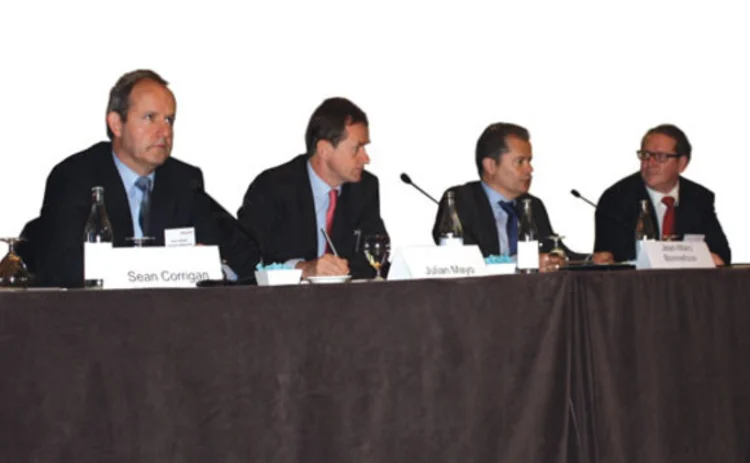
Commodities Trading and Investment Summit: conference highlights
China, oil prices and the impact of regulation were among the topics hotly debated at Energy Risk’s inaugural Commodities Trading and Investment Summit held in Geneva last month. Ned Molloy reports

Fund managers, chief investment officers, investment consultants, and traders gathered in the Hotel President Wilson next to Lake Geneva on June 21 for Energy Risk’s inaugural Commodities Trading and Investment Summit, which attracted a panoply of speakers analysing commodity markets and investment strategies.
A broad examination
Keith Wade, chief economist and strategist at Schroders, kicked off proceedings with his macro view of the economy and the outlook for commodities.
Although China has become the world’s largest energy consumer, it still has a long way to go on a per-capita basis, Wade said. The average Chinese person consumes two barrels of oil per year compared to an average of more than 20 barrels in the US. If China were to match US consumption levels, it would require all the world’s current energy supply.
Wade next analysed the chances of several key emerging markets overheating. He noted that food price increases had a much bigger impact on inflation in developing countries because they formed a greater proportion of people’s personal expenditure and, hence, of the overall basket of goods used to measure inflation.
Nevertheless, Wade said Schroders foresaw a soft landing in China and did not put any serious weight to the scenario of the Chinese bubble bursting and dragging down the world economy.
Risk watch
Next up was Tony Hall, explaining the approach of Duet Commodities Fund to managing market risk. The fund is agnostic on price direction, it expects 20% returns year on year, and is run on 99 Value at Risk, one-year one-day historical, Hall said. As well as the usual stress tests, Duet runs scenario-specific analyses, testing the resilience of the fund to specific extreme market-moving events.
Following Hall’s talk was a panel discussion on emerging market risks. Julian Mayo, co-chief investment director at Charlemagne Capital, pointed out that China was still at an early stage of development. Convergence between the developed and developing world could actually happen with the shrinking of incomes per capita in the West, particularly with the US recovery losing steam, he said.
Jean-Marc Bonnefous, managing partner at Tellurian Capital Management, criticised the simplistic approach of treating commodities as just a gross domestic product (GDP) trade. Sean Corrigan, chief investment strategist at Diapson Commodities, agreed there was only a loose correlation between GDP and commodity prices.
Bonnefous stressed the magnitude of sharp slowdown in growth in China for global commodity markets. “If there’s a hard landing, they will sell everything,” he said, explaining that this presented the opportunity to buy lots of commodities cheaply and profit over the next five years.
The panellists clashed on whether quantitative easing (QE) in the US was helping or hindering China. Some thought China was telling the US to stop QE, while secretly wanting it.
But Mayo argued that the unpopularity of QE in the US was because it transferred wealth from the middle class in the long term, to traders and bankers in the short term.
Corrigan criticised the widespread adulation of the Chinese economy as misplaced, criticising its centralised model as creating major distortions and inefficiencies. The mass power shortages in China were because of price suppression, he argued.
Only users who have a paid subscription or are part of a corporate subscription are able to print or copy content.
To access these options, along with all other subscription benefits, please contact info@risk.net or view our subscription options here: http://subscriptions.risk.net/subscribe
You are currently unable to print this content. Please contact info@risk.net to find out more.
You are currently unable to copy this content. Please contact info@risk.net to find out more.
Copyright Infopro Digital Limited. All rights reserved.
As outlined in our terms and conditions, https://www.infopro-digital.com/terms-and-conditions/subscriptions/ (point 2.4), printing is limited to a single copy.
If you would like to purchase additional rights please email info@risk.net
Copyright Infopro Digital Limited. All rights reserved.
You may share this content using our article tools. As outlined in our terms and conditions, https://www.infopro-digital.com/terms-and-conditions/subscriptions/ (clause 2.4), an Authorised User may only make one copy of the materials for their own personal use. You must also comply with the restrictions in clause 2.5.
If you would like to purchase additional rights please email info@risk.net
More on Risk management
Many banks yet to factor climate into credit risk models
More than a third of banks do not quantify climate risk impact on credit portfolios, study finds
At BNY, a risk-centric approach to GenAI
Centralised platform allows bank to focus on risk management, governance and, not least, talent in its AI build
We’re gonna need a bigger board: geopolitical risk takes centre stage
As threats multiply, responsibility for geopolitical risk is shifting to ERM teams
CROs shoulder climate risk load, but bigger org picture is murky
Dedicated teams vary wildly in size, while ownership is shared among risk, sustainability and the business
Climate Risk Benchmarking: explore the data
View interactive charts from Risk.net’s 43-bank study, covering climate governance, physical and transition risks, stress-testing, technology, and regulation
ISITC’s Paul Fullam on the ‘anxiety’ over T+1 in Europe
Trade processing chair blames budget constraints, testing and unease over operational risk ahead of settlement move
‘The models are not bloody wrong’: a storm in climate risk
Risk.net’s latest benchmarking exercise shows banks confronting decades-long exposures, while grappling with political headwinds, limited resources and data gaps
Cyber insurance premiums dropped unexpectedly in 2025
Competition among carriers drives down premiums, despite increasing frequency and severity of attacks







